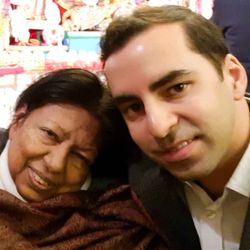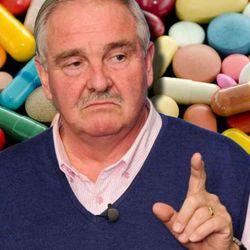Share

Still Practicing: The Medlife Crisis Podcast
#1 How to prevent almost ALL disease
This is an in-depth interview with scientist, author and expert on longevity science, Dr Andrew Steele. We discuss what ageing even is, whether it should be regarded as a disease, how we differ from other animals, where the research is, what treatments look promising, health and economic policy, and what the future looks like.
Watch all my videos and listen to my podcasts early and without any ads, plus hundreds more exclusive titles, over on Nebula https://nebula.com/medlifecrisis. Sign up today via this link and save $10 off the annual price. It's the best way to support this podcast. Thank you!
Find Andrew here:
https://www.youtube.com/DrAndrewSteele
Book: Ageless.link
https://twitter.com/statto
https://www.instagram.com/andrewjsteele
More Medlife Crisis:
https://twitter.com/medcrisis
https://www.youtube.com/medlifecrisis
https://www.youtube.com/channel/UCXFgI0Lgrwc_fY2ttqQ9Yhg
https://watchnebula.com/medlifecrisis
https://www.instagram.com/medcrisis
More episodes
View all episodes

3. #3 Should doctors help people end their lives? A doctor's view
43:07||Season 1, Ep. 3This is a really different episode for me. My Mum died in 2018, soon after I'd posted my second ever video to the internet. She had a horrible final year of life, consumed by anxiety and fear about how she would die, having been diagnosed with an incurable terminal disease. I explore the arguments for and against Assisted Dying, both as a son who cared for his mother through a horrible disease, and as a doctor.-----------------My sponsorship fee for this video will go to the Motor Neurone Disease Association https://www.mndassociation.org/. Thank you for helping me help a cause I care deeply about.-----------------Get Nebula using my link for 40% off an annual subscription: https://go.nebula.tv/medlifecrisisSign up for my free newsletter: https://medlife.substack.com/The BMJ's section on Assisted Dying: https://www.bmj.com/assisted-dying (lots of pieces contained therein)UK Parliament Briefing https://researchbriefings.files.parliament.uk/documents/POST-PB-0047/POST-PB-0047.pdfArticle about Graham Mansfield https://www.theguardian.com/society/2022/jul/22/man-who-killed-his-wife-in-act-of-love-calls-for-assisted-dying-lawConcerns about Canadian slippery slope and social provisions https://www.theguardian.com/world/2022/may/11/canada-cases-right-to-die-laws LinksDignity in Dying https://www.dignityindying.org.ukAssisted Dying Coalition Www.assisteddying.org https://www.mydeath-mydecision.org.ukMy article that I mentioned about DNR and disability https://www.theguardian.com/healthcare-network/views-from-the-nhs-frontline/2016/may/09/good-death-should-doctors-patients-last-life-goal
2. #2 Psychedelics: The worst science censorship in history – Professor David Nutt
01:11:29||Season 1, Ep. 2Episode 2 is a special one for me. This is an interview recorded in late 2021 with Professor David Nutt, a man who has been at the forefront of research into psychedelics, cannabis, MDMA, tobacco and alcohol for almost 4 decades. His work is not only fascinating but unbelievably important and could lead to a revolution in how we think about drugs, but more importantly, how we can use them to help people. We also cover politics, policy, history, how challenging undertaking research in this field can be, and more. Thanks for listening!More Medlife Crisis:https://twitter.com/medcrisishttps://www.youtube.com/medlifecrisishttps://www.youtube.com/@medlife2https://watchnebula.com/medlifecrisishttps://www.instagram.com/medcrisisThe Drug Science charity, independent unbiased drug information: https://www.drugscience.org.uk/Check out the Drug Science podcast as well https://open.spotify.com/show/2hLSRIS777SKphWxv4HyDKReferences mentioned:Trial of Psilocybin versus Escitalopram for Depression https://www.nejm.org/doi/full/10.1056/NEJMoa2032994Self-blinding citizen science to explore psychedelic microdosing https://elifesciences.org/articles/62878